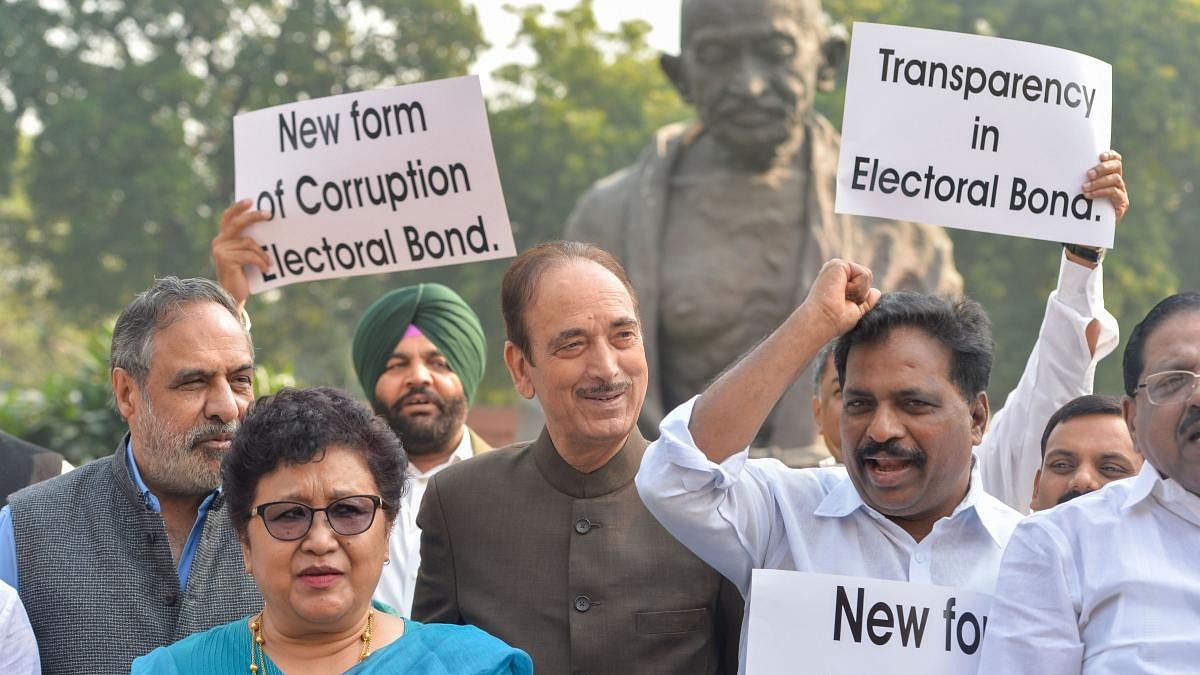
File photo of former Congress MP Ghulam Nabi Azad with then colleagues Anand Sharma and others staging a protest over alleged electoral bond outside Parliament complex in Delhi.
Credit: PTI File Photo
The Supreme Court, in a landmark decision on February 15, declared the electoral bonds scheme introduced by the previous Narendra Modi-led National Democratic Alliance (NDA) government in 2017, unconstitutional. The judgment has stirred a hornet’s nest with all kinds of speculation on the possible reactions from the government. While speculation on that issue is beyond this article, this is about what the judgment has done.
Though the two paragraphs in the then Finance Minister’s Budget Speech which introduced the scheme as part of the 2017 Budget, were titled ‘Transparency in Electoral Funding’, as the details of the scheme came to be known, it was clear that it removed whatever flimsy layer of transparency the electoral system had.
In a nutshell, the scheme permitted any person or company to donate whatever amount of money it wanted, to any political party which had polled at least 1 per cent votes in the previous election. Disguisedly included in the fine print of the scheme were provisions such as permitting all companies, including those who are running into losses, to donate as much money as they like to political parties without anyone knowing about it.
The most damaging part of the scheme was its potential by which the political party in power could choke the funding of every opposition party. This was enabled by the provision that the only issuing bank, which was the State Bank of India (SBI), was to collect the KYC (know your customer) details of everyone or institution that purchased electoral bonds (EBs) and was not to disclose this information to anyone without a court order. That said, there was nothing that prevented government-owned SBI from sharing this information with the government of the day through its parent ministry, the finance ministry.
Once the finance ministry or the minister had access to this information, their party also had access to it. The political party then had the option of influencing or coercing the buyer of the EB to prevent them from donating to an opposition party, and instead donating it to the ruling party. Since this option was not available to opposition parties, this is what the Supreme Court called an uneven playing field, and gave it as one of the reasons for striking down the scheme.
The other main reason was that the scheme violated the citizens’/voters’ fundamental right to get information about the sources of funding for political parties.
The judgment would help restore people’s faith in democracy, and the rule of law because it removes one of the major dysfunctionalities in the electoral funding system, which was introduced in 2017. The pre-2017 system was far from satisfactory, and improvements are also needed, which must be done without introducing distortions such as electoral bonds.
(Jagdeep S Chhokar is a founder-member of the Association for Democratic Reforms (ADR), which is one of the petitioners in the Supreme Court in the Electoral Bonds case, X handle: @JagdeepChhokar of @adrspeaks)
Disclaimer: The views expressed above are the author's own. They do not necessarily reflect the views of DH.